Daily Vocabulary Words: List of Daily Used Words in Leading International Newspapers
Hi there. Welcome to this special section @ Wordpandit.
Our endeavour here is very simple: to highlight important daily vocabulary words, which you would come across in leading newspapers in the country. We have included the following newspapers in our selection:
• The New York Times
• The Washington Post
• Scientific American
• BBC
• The Guardian
• Psychology Today
• Wall Street Journal
• The Economist
We are putting in extensive work for developing your vocabulary. All you have got to do is be regular with this section and check out this post on a daily basis. This is your repository of words that are commonly used and essentially, we are posting a list of daily used words. Hence, this has significant practical application as it teaches you words that are used commonly in leading publications mentioned above.
Visit the website daily to learn words from leading international newspapers.
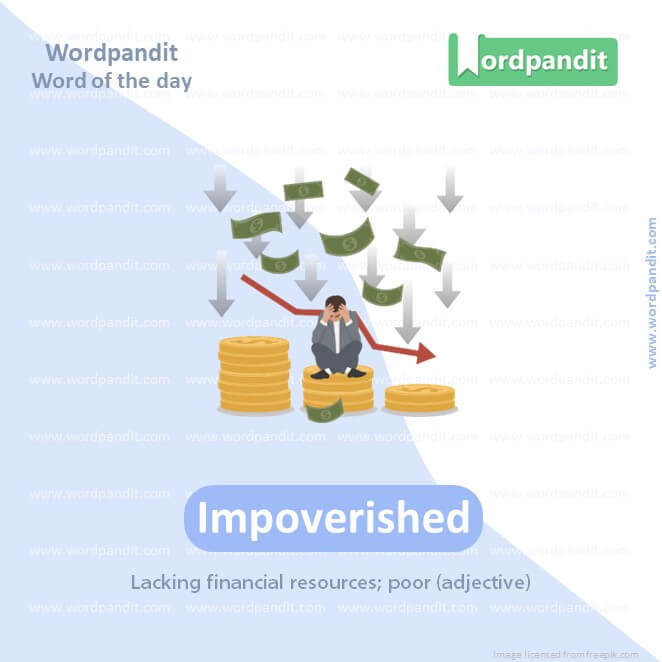
WORD-1: Impoverished
CONTEXT: it was an impoverished slice of sand and coastal seawater, with some agricultural areas.
SOURCE: New York Times
EXPLANATORY PARAGRAPH: Think about a place where people don’t have enough money to buy food or nice clothes, and houses are not in good shape. Impoverished means very poor, without enough money to live a comfortable life.
MEANING: Lacking financial resources; poor (adjective).
PRONUNCIATION: im-POV-er-isht
SYNONYMS: Poor, Needy, Destitute, Indigent, Penniless.
USAGE EXAMPLES:
1. The charity focused on helping impoverished communities.
2. She came from an impoverished background.
3. The drought left the region even more impoverished.
4. Efforts were made to improve the lives of impoverished children.
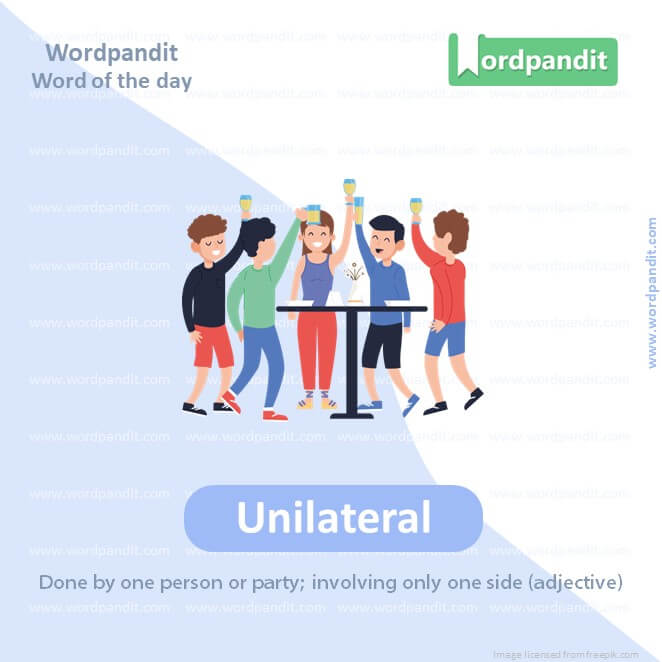
WORD-2: Unilateral
CONTEXT: In September 2005, Ariel Sharon completed a unilateral withdrawal of all Israeli forces and settlements from Gaza, which Israel occupied in the 1967 war.
SOURCE: New York Times
EXPLANATORY PARAGRAPH: Imagine making a decision about a game without asking your friends. Unilateral is like that. It’s when someone does something or decides something on their own, without asking or waiting for others.
MEANING: Done by one person or party; involving only one side (adjective).
PRONUNCIATION: yoo-ni-LAT-er-ul
SYNONYMS: One-sided, Independent, Solo, Autonomous, Individual.
USAGE EXAMPLES:
1. The government made a unilateral decision.
2. He took unilateral action without consulting his team.
3. The unilateral declaration was unexpected.
4. Unilateral decisions can sometimes lead to conflicts.
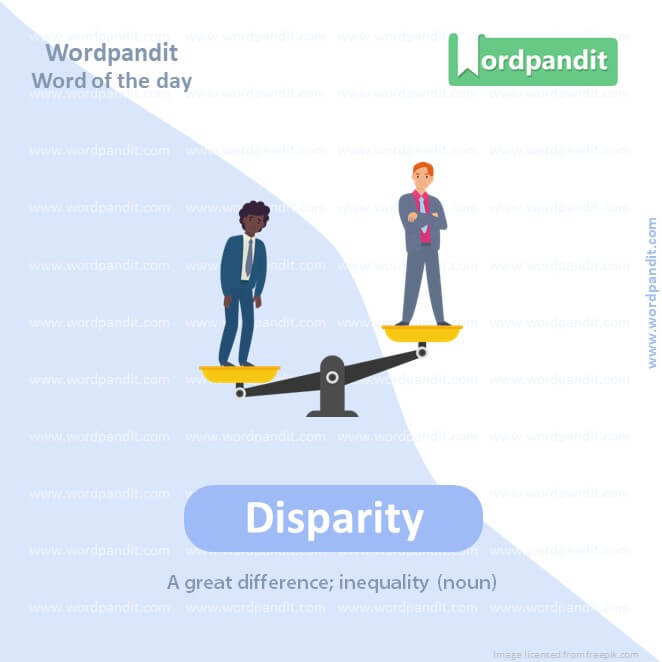
WORD-3: Disparity
CONTEXT: In the United States, we’ve come to accept short-run disparity as a necessary side effect of biomedical progress.
SOURCE: Washington Post
EXPLANATORY PARAGRAPH: Imagine two friends, where one has 10 toys, and the other has only 1. Disparity is when there’s a big difference between two things, like the number of toys each friend has.
MEANING: A great difference; inequality (noun).
PRONUNCIATION: dis-PAR-i-tee
SYNONYMS: Inequality, Imbalance, Gap, Discrepancy, Divergence.
USAGE EXAMPLES:
1. The disparity in wealth between the two neighborhoods was striking.
2. There’s a significant income disparity in the country.
3. The study highlighted the disparity in educational opportunities.
4. Disparity in treatment can lead to tension.
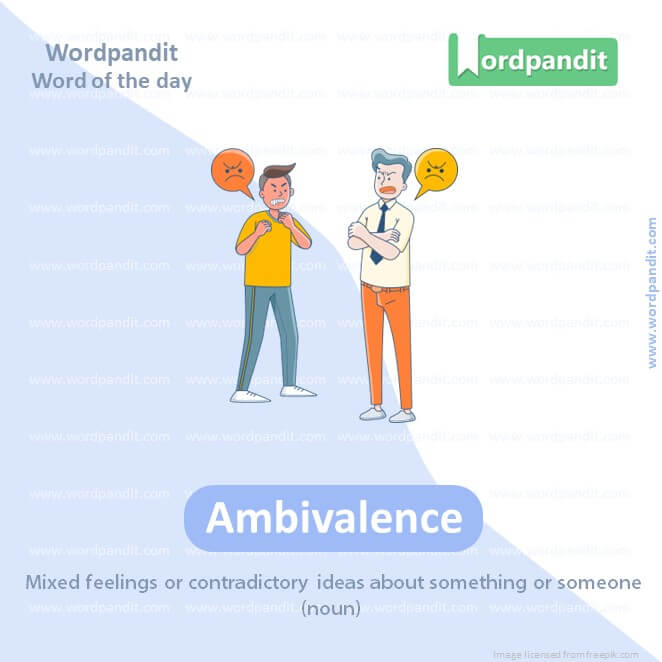
WORD-4: Ambivalence
CONTEXT: this number would not express my ambivalence about Sandra’s culpability in her husband’s death, nor my deeply felt relief at the resolution of the dog storyline.
SOURCE: Guardian
EXPLANATORY PARAGRAPH: Think about when you can’t decide if you like something or not, like a new food that tastes both good and bad. Ambivalence is when you have mixed feelings or can’t decide how you feel about something.
MEANING: Mixed feelings or contradictory ideas about something or someone (noun).
PRONUNCIATION: am-BIV-uh-lens
SYNONYMS: Uncertainty, Indecision, Conflict, Hesitation, Mixed emotions.
USAGE EXAMPLES:
1. She felt ambivalence about her new job.
2. His ambivalence about the move was obvious.
3. There is widespread ambivalence about the new policy.
4. Ambivalence in relationships can be challenging.
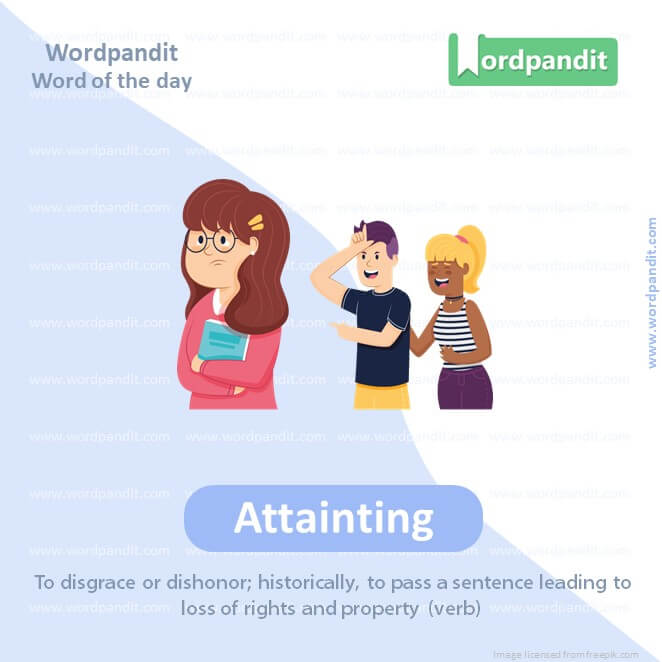
WORD-5: Attainting
CONTEXT: The risks and costs of inventing a treatment, running clinical trials, and attainting regulatory approval are high, so the prices of new medicines must also be high, if companies are to bring them to market.
SOURCE: Washington Post
EXPLANATORY PARAGRAPH: Imagine someone being declared guilty in a court and losing all their rights and honors. Attainting is like that. It’s an old legal term that means declaring someone guilty of a crime and taking away their rights and honors.
MEANING: To disgrace or dishonor; historically, to pass a sentence leading to loss of rights and property (verb).
PRONUNCIATION: uh-TAYNT-ing
SYNONYMS: Disgracing, Dishonoring, Condemning, Tarnishing, Stigmatizing.
USAGE EXAMPLES:
1. The nobleman was attainted of treason.
2. Attainting someone in medieval times had severe consequences.
3. The law of attainting was used to punish rebels.
4. The attainting process was abolished in modern legal systems.
WORD-6: Transfixed
CONTEXT: the times I spent listening to Lana Del Rey on Spotify that I will remember, but the hour I spent transfixed by her chaotic performance at Glastonbury festival.
SOURCE: Guardian
EXPLANATORY PARAGRAPH: Imagine watching a magician doing an amazing trick, and you can’t look away or move because it’s so fascinating. Transfixed is when you’re so amazed or scared by something that you can’t move or stop looking at it.
MEANING: Rendered motionless with astonishment, amazement, or terror (verb).
PRONUNCIATION: trans-FIKST
SYNONYMS: Mesmerized, Fascinated, Captivated, Spellbound, Riveted.
USAGE EXAMPLES:
1. The audience was transfixed by her performance.
2. He was transfixed by the stunning view.
3. The horror movie left viewers transfixed in their seats.
4. She stood transfixed, unable to believe the news.
WORD-7: Pleasurable
CONTEXT: Indeed, in looking forward to the next year, I am hoping for more pleasurable, private encounters with art – and more moments of connection with people, not data points.
SOURCE: Guardian
EXPLANATORY PARAGRAPH: Think about doing your favorite thing, like playing a game or eating ice cream. Pleasurable is when something makes you feel really happy and good, like enjoying your favorite activity.
MEANING: Causing a feeling of happiness or enjoyment (adjective).
PRONUNCIATION: PLEZH-ur-uh-buhl
SYNONYMS: Enjoyable, Delightful, Satisfying, Gratifying, Pleasant.
USAGE EXAMPLES:
1. The vacation was a pleasurable experience.
2. She found reading very pleasurable.
3. It was a pleasurable evening with friends.
4. The warm sun was pleasurable after the cold weather.
WORD-8: Conceivable
CONTEXT: it would have been the most powerful springboard conceivable for a Palestinian state in the West Bank, in the heart of the Palestinian ancestral homeland.
SOURCE: New York Times
EXPLANATORY PARAGRAPH: Imagine thinking of all the different animals that could possibly exist, even ones that are very strange. Conceivable means something that you can imagine or think of, even if it’s very unusual or unlikely.
MEANING: Capable of being imagined or believed; possible (adjective).
PRONUNCIATION: kun-SEE-vuh-buhl
SYNONYMS: Possible, Imaginable, Thinkable, Plausible, Believable.
USAGE EXAMPLES:
1. Every conceivable effort was made to find a solution.
2. It’s conceivable that the plan could fail.
3. He prepared for every conceivable problem.
4. She couldn’t think of a conceivable reason for his behavior.
WORD-9: Refutation
CONTEXT: the Bush team insisted that Hamas be permitted to run without embracing Oslo, hoping that it would lose and this would be its ultimate refutation.
SOURCE: New York Times
EXPLANATORY PARAGRAPH: Think about proving someone wrong when they say something that’s not true. Refutation is like that. It’s when you prove that something is not true or correct.
MEANING: The act of proving a statement or theory to be wrong or false (noun).
PRONUNCIATION: ref-yoo-TAY-shun
SYNONYMS: Disproof, Rebuttal, Denial, Disproval, Counterargument.
USAGE EXAMPLES:
1. The lawyer offered a strong refutation of the charges.
2. His refutation of the theory was widely accepted.
3. The article was a refutation of the previously published data.
4. She wrote a refutation to the criticism of her work.
WORD-10: Antiretrovirals
CONTEXT: With HIV, decades of activism, philanthropic largesse and global support have expanded access to lifesaving antiretrovirals.
SOURCE: Washington Post
EXPLANATORY PARAGRAPH: Imagine special medicines that help people who have a virus in their body, making them feel better and healthier. Antiretrovirals are medicines used to treat people with HIV, a virus that can make them very sick. They help keep the virus under control.
MEANING: Drugs used to treat retroviruses, particularly HIV (noun).
PRONUNCIATION: an-tee-reh-troh-VY-ruls
SYNONYMS: ARVs, HIV medications, Retrovirus inhibitors, Antiviral drugs, HIV antiretrovirals.
USAGE EXAMPLES:
1. Antiretrovirals have improved the lives of many HIV patients.
2. He started taking antiretrovirals after his diagnosis.
3. The development of antiretrovirals has been a major medical breakthrough.
4. Access to antiretrovirals is crucial in HIV/AIDS treatment.
Vocabulary Meaning
In the ocean of language learning, ‘vocabulary meaning’ is akin to the colorful coral reefs that add depth and vibrancy to communication. Yet, infusing our interactions with this vibrancy is often a challenge for many language learners. The crux lies in effectively deciphering and employing the ‘vocabulary meaning’.
Learning ‘vocabulary meaning’ isn’t about merely gluing words to their definitions. It’s about forming a deep understanding and connection with these words that transcends rote learning. To gain a comprehensive grasp of ‘vocabulary meaning’, one needs to navigate beyond textbook definitions and commit to exploiting diversified resources such as novels, films, music, articles, and digital content. This allows one to encounter vocabulary in a variety of contexts and actual usage, giving deeper insight into their meaning.
However, understanding ‘vocabulary meaning’ involves another essential aspect—memory retention. Techniques such as spaced repetition and the Leitner System offer effective methodologies to maintain and consolidate the ‘vocabulary meaning’. Additionally, leveraging mnemonic strategies can help etch words into your memory by linking them with unique stories or imagery that are personal and easily recallable.
Another way of mastering ‘vocabulary meaning’ is by immersing yourself in the language. Engage in regular conversations with native speakers if possible or utilize language exchange platforms to practice your skills. This not only bolsters your understanding of how the vocabulary is used but also helps articulate the ‘vocabulary meaning’ in the societal and cultural contexts.
In conclusion, gaining a robust grasp of ‘vocabulary meaning’ is a journey rather than an end goal. It requires dedication, perseverance and most importantly, a multi-faceted approach that includes diversified resources, effective memory strategies, and real-life application. With these strategies in place, the depths of ‘vocabulary meaning’ are no longer daunting but become an enchanting exploration of language.











